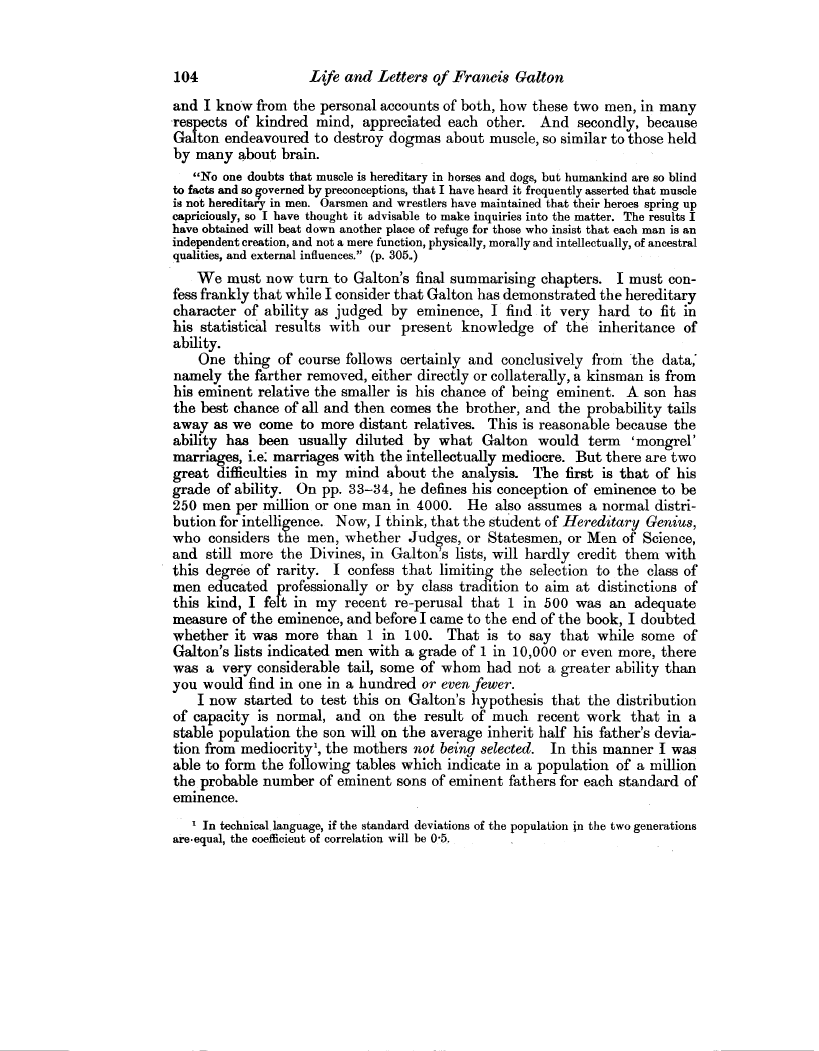104 Life and Letters of Francis Galton
and I know from the personal accounts of both, how these two men, in many respects of kindred mind, appreciated each other. And secondly, because Galton endeavoured to destroy dogmas about muscle, so similar to those held by many about brain.
"No one doubts that muscle is hereditary in horses and dogs, but humankind are so blind to facts and so governed by preconceptions, that I have heard it frequently asserted that muscle is not hereditary in men. Oarsmen and wrestlers have maintained that their heroes spring up
capriciously, so I have thought it advisable to make inquiries into the matter. The results I have obtained will beat down another place of refuge for those who insist that each man is an independent creation, and not a mere function, physically, morally and intellectually, of ancestral
qualities, and external influences." (p. 305.)
We must now turn to Galton's final summarising chapters. I must confess frankly that while I consider that Galton has demonstrated the hereditary character of ability as judged by eminence, I find it very hard to fit in his statistical results with our present knowledge of the inheritance of ability.
One thing of course follows certainly and conclusively from the data, namely the farther removed, either directly or collaterally, a kinsman is from his eminent relative the smaller is his chance of being eminent. A son has the best chance of all and then comes the brother, and the probability tails away as we come to more distant relatives. This is reasonable because the ability has been usually diluted by what Galton would term `mongrel' marriages, i.e. marriages with the intellectually mediocre. But there are two great difficulties in my mind about the analysis. The first is that of his grade of ability. On pp. 33-34, he defines his conception of eminence to be 250 men per million or one man in 4000. He also assumes a normal distribution for intelligence. Now, I think, that the student of Hereditary Genius, who considers the men, whether Judges, or Statesmen, or Men of Science, and still more the Divines, in Galton's lists, will hardly credit them with this degree of rarity. I confess that limiting the selection to the class of men educated professionally or by class tradition to aim at distinctions of this kind, I felt in my recent re-perusal that 1 in 500 was an adequate measure of the eminence, and before I came to the end of the book, I doubted whether it was more than 1 in 100. That is to say that while some of Galton's lists indicated men with a grade of 1 in 10,000 or even more, there was a very considerable tail, some of whom had not a greater ability than you would find in one in a hundred or even fewer.
I now started to test this on Galton's hypothesis that the distribution of capacity is normal, and on the result of much recent work that in a stable population the son will on the average inherit half his father's deviation from mediocrity', the mothers not being selected. In this manner I was able to form the following tables which indicate in a population of a million the probable number of eminent sons of eminent fathers for each standard of eminence.
I In technical. language, if the standard deviations of the population in the two generations are-equal, the coefficient of correlation will be 0.5.

